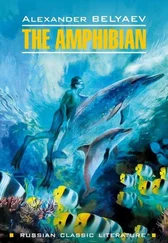Ichthyander got into the barrel. The Indian crew pressed round the hatch, in goggle-eyed wonder. They did not know yet that the prisoner was the “sea-devil “in flesh.
“Get the hell out of here! “ Zurita shouted at them from the hatchway.
Far from being able to swim Ichthyander could not even stretch full-length in the barrel and had to crouch for a full dip. Besides the barrel had been used for keeping salt pork in and the water in it was soon giving off a foul stench, making things not much better for Ichthyander than they had been before.
Meanwhile the schooner sped north, running before a fresh south-easterner.
Zurita went down to Ms cabin from the bridge in the bleary pre-dawn hour. He hoped his wife would have been long in bed. But he found her sitting up at the narrow table, her head resting on her arms. On his entry Gutierrez rose and in the dim light of the lamp hanging from the ceiling he saw a pale determined face.
“You deceived me,” she said in a hollow voice.
Somewhat disconcerted, even embarrassed, under Ms wife’s glaring eyes, yet anxious to conceal it, Zurita affected an I’m-sure-I-don’t-know-what-you-mean expression and gave his moustache a smart twist.
“Ichthyander chose to stay on board the Jellyfish to be near you,” he said ban-teringly.
“That’s a lie! You’re a mean and despicable man. I hate you! “ Without warning she snatched a dagger from its place on the wall and swung it at Zurita.
“Oho,” said Zurita as he caught her hand and gave it a savage squeeze that made her drop the weapon.
Then he kicked the dagger out of the cabin and let go of his wife’s hand.
“That’s better,” he said. “A drink of iced water should do your nerves a power of good.”
And he went out and locked the door.
As he came out on deck the eastern horizon was turning rosy while the still hidden sun had set the flimsy clouds afire. Salty and fresh, the morning breeze filled the sails. Sea-gulls wheeled above, on the look-out for unwary fish.
When the sun had come up Zurita was still pacing the deck, his hands clasped behind his back.
“Well, I’ve managed worse things, haven’t I,” he finally said to himself.
Then he ordered the crew to furl the sails. Presently the Jellyfish was riding at anchor on the lumpy seas.
“Fetch the prisoner and the chain,” Zurita ordered. He’d been itching to test Ichthyander’s performance as pearl-diver since he’d brought him on board. Besides hell perk up a bit in the water, he thought.
Two Indians frogmarched Ichthyander out on deck to the mizzen and stopped there. He threw a glance round him. The ship’s rail was only a few paces away. Without warning Ichthyander lunged for the rail and was about to jump overboard when Zurita’s heavy fist caught him on the side of his head. He dropped without as much as a groan.
“Haste doesn’t pay,” Zurita said sententiously.
There was a clang of iron as one of the sailors lugged out on deck a coil of thin chain ending in a band, also made of iron. Zurita adjusted the band round the still unconscious amphibian’s middle and locked it.
“Pour some water on his head,” he told the sailors.
After a while the young man came to himself and stared, bewildered, at the chain to which he was shackled.
“That’s to stop you running away,” Zurita explained. “I’m going to let you into the sea. Youll be looking for pearl shells for me. The more pearls you find the longer you stay in the sea. But no funny business, mind, or back you go into your barrel. Understand? Now, is that a bargain?”
Ichthyander nodded.
He was willing to get for Zurita all the treasures of the sea, so long as he could stay in its clean waters.
Zurita, the chained Ichthyander and his Indian escort went to the rail again. Gutierrez’s cabin was on the other side of the ship: Zurita did not particularly wish her to see Ichthyander in irons.
Ichthyander was lowered into the water and onto the sea-bottom. If he could only break the chain! But it was too strong for him and, resignedly, Ichthyander set to collecting pearl shells and putting them into the bag that hung from his side. The iron band pressed his sides, making breathing rather difficult. And yet Ichthyander felt almost happy after having been doubled up for a whole night in that reeky barrel.
Up on deck the sailors, all agog, watched the happening. Minutes passed but the man on the sea-bed showed no sign of coming up. At first bubbles of air had appeared on the surface but soon even these ceased.
“Ill be eaten up by a shark if he’s got a gasp of air left in them lungs of his. Looks he feels hisself as much at home down there as a fish,” an old pearl-diver said in amazement, peering into the water below where the young man could be easily seen crawling on all fours along the sea-bed.
“May be it’s the ‘sea-devil’ himself?” a sailor said softly.
“Sea-devil or no sea-devil, the captain’s made a jolly good bargain,” said the first mate. “A diver like this is worth a dozen.”
The sun was close to the zenith when Ichthyander tugged at the chain to be pulled up. His bag was brim-full and he wanted to empty it so that he could go on with his work.
The Indian sailors hauled up the wonder diver in a trice. Everybody was dying to see the catch.
Ordinarily pearl shells are left alone for some days to rot but this time Zurita and his crew were far too impatient. So everybody set to work, prising the shells open with knives.
When they had finished with the shells everybody began to speak at once. A clamour of eager voices broke on deck. Perhaps Ichthyander had been lucky to strike a paying spot, but anyway what he had brought up in his very first bag surpassed everybody’s expectations. Among the numerous pearls there were a score of heavies, of excellent shape and exquisite colouring. Indeed his very first catch had brought Zurita a fortune. For the price of one of the bigger pearls he could buy a new schooner. Zurita was on the road to wealth. His dreams were coming true.
Then Zurita became aware of the greedy glances the sailors were throwing at the pearls. He didn’t like it and hastened to scoop the pearls into his straw hat.
“It’s time we all had breakfast,” he said dismissing the crew. “You’re not a bad diver, Ichthyander. I’ve got a spare cabin. I’m going to give it over to you. It won’t be so close there. And I’ll have a zinc tank made for you, though, you may not need it, seeing as you’re likely to swim in the sea every day. Chained, to be sure. But what can I do? You’d swim away of me otherwise, back to your crabs.”
Ichthyander hated to speak with Zurita. But so long as he was that man’s prisoner he should at least try and get decent lodgings out of him.
“A tank’s better than a stinky barrel,” he said to Zurita, “but youll have to change water often for me to breathe comfortably.”
“How often?” “Every half hour,” said Ichthyander. “Running water’d be still better.”
“I can see your head’s turned with success. I’ve praised you a little and here you are, demanding things, picking and choosing.”
“I’m not picking and choosing,” Ichthyander said in a hurt voice. “I’m-don’t you see, if you put a big fish into a pail of water it soon goes to sleep. A fish breathes oxygen out of the water and I–I’m no more than a very big fish really,” Ichthyander said with a self-conscious smile.
“I don’t know about oxygen but I do know that fish croak if you don’t change their water. Perhaps you’re right. But pumping water into your tank round the clock will cost me a pretty penny, more than your pearls are worth. You’ll ruin me that way.”
Читать дальше










